Biodiversity benefits from switching to organic take time to accrue

Published: October 11, 2024
Category: Organic News
A Lund University, Sweden, study suggests that it takes several decades to reap benefits of growing organic crops on land previously using conventional practices.
Researchers from Lund University wanted to know how long it takes biodiversity markers to recover after the switch to organic growing—and how significant the recovery would be. The study looked at 88 fields in southern Sweden on 30 different farms; arable plant species doubled (from 15 to 35) after thirty years of doing organic protocols.
“We were surprised by the sharp increase in the number of plant species. After thirty years, we weren’t expecting that, and it looks like it may continue to increase,” said Romain Carrié, lead researcher. “If it takes a while before organic farming’s full potential for biodiversity hits, we might have underestimated the benefits that organic methods provide so far. Our results indicate that one must take into account a certain delay after a transition in order not to underestimate the benefit to the environment.”
The transition time necessitates adjusting financial compensation for farmers, added Carrié. A key discovery from the research is that plants that are sensitive to herbicides took longer to re-establish themselves in the fields after switching from conventional agriculture. Yet, the most sensitive species contributed most to recovery over time. Greater dependence on pollinators added to the recolonization time.
Source: Phys.org
To view source article, visit:
Organic & Non-GMO Insights October 2024




